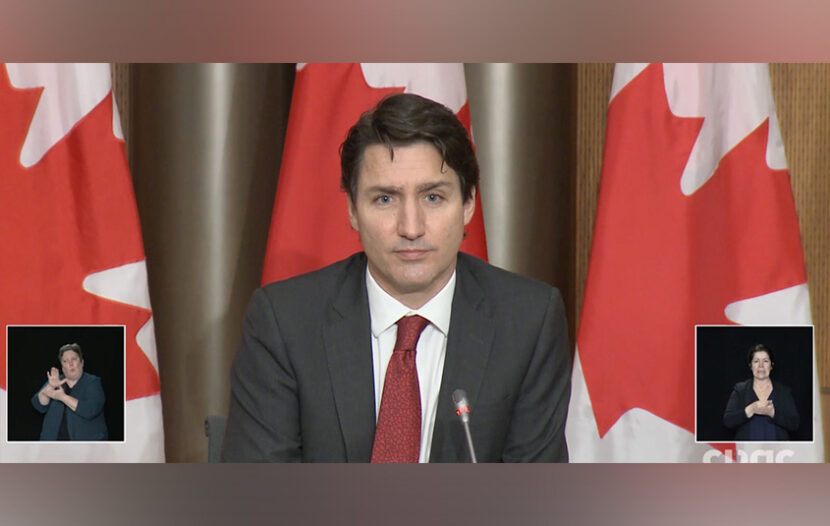TORONTO — So far at least the federal government is holding the line on letting Canadians make their own best choices when it comes to travel plans in the weeks ahead.
This morning Prime Minister Justin Trudeau was asked about the omicron variant, in light of UK Prime Minister Boris Johnson’s warning over the weekend that the UK is facing a “tidal wave” of new COVID-19 cases with the omicron variant. Johnson urged the need for booster shots in the UK.
Trudeau was asked if Canada needs to formally advise people not to travel in the coming weeks.
In response, Trudeau said: “We’re obviously very concerned with the omicron variant that has arrived but we can also see the delta cases rising in Ontario, Quebec and elsewhere in the country. Therefore we remind people to be vigilant and to follow the recommendations and instructions issued by public health authorities and Health Canada.”
The best thing to do, he continued, is to get vaccinated, adding that Canada is now at almost 90%. He added that getting booster shots and booking young kids for their vaccinations are also key.
Trudeau then noted the new rules for air arrivals into Canada, now in effect, which require testing upon arrival and self-isolation pending those test results.
“We have added different rules to protect people. Canadians have been living for months and months with variants and difficult situations,” said Trudeau. “And what I encourage everyone to do is to watch out for what the public health rules are, and make their decisions as a result of that.”
FRIDAY’S BRIEFING WITH HEALTH MINISTER DUCLOS
As reported on Travelweek.ca last week, during his Friday briefing Health Minister Jean-Yves Duclos also stopped short of telling Canadians not to travel in the coming weeks.
However Duclos did have a message for anyone planning to travel: “You need to plan ahead. Be prepared for airport delays. Use the ArriveCAN app. Have a quarantine plan. And be prepared for officials to follow up. Outside of Canada, the situation [in light of the omicron variant] is evolving very rapidly. And things can change rapidly. In some European countries, things are getting very complicated [with the spread of omicron].”
Later in last Friday’s briefing, Duclos said: “The new variant tells us we need to be vigilant. Right now in Canada community transmission is limited. However for Canadians thinking about travelling outside of the country, omicron should be a big red part of their radar screen. It should be a serious alarm bell. There is uncertainty and risks with travelling in other countries over the next few weeks.”
He was also asked about the blanket travel advisory against all non-essential travel, which just lifted weeks ago. He said the federal government is currently not making changes to any advisory. “That could come” depending on the evolving situation, he said. “My advice to Canadians is, be extremely prudent when thinking about travelling.”
Duclos also spoke about quarantine measures. “Returning travellers may need to quarantine for a few days, maybe longer, it may be strict and severe” if the omicron situation devolves.
As announced last month, all air arrivals to Canada except from the U.S. must be tested for COVID-19 and self-isolate until the results are known. On Nov. 30 Canada’s airports were processing 11,000 tests per day. As of yesterday, Dec. 9, that number was up to 17,000. The number needs to reach 23,000, said Duclos. “We are gradually ramping up testing capacity at the airports,” he said.
CALL TO FAST-TRACK LIFTING OF TRAVEL BANS
Meanwhile ACTA has joined travel agency associations from around the world in the call for governments to fast-track the lifting of travel bans.
ACTA was one of half a dozen organizations behind a statement issued today outlining the gravity of the situation facing the global travel industry, already devastated by close to two years of on-again, off-again travel restrictions.
The organizations collectively represent hundreds of thousands of people who work at travel agencies and related businesses around the world.
“Given their clear and devastating impact on the global economy, travel restrictions and outright bans cause severe economic harm. The ability to travel safely continues to be a fundamental marker for our success over this virus. Restricting access to travel only perpetuates the economic impact and postpones global recovery in terms of travel and multiple other economic drivers around the globe,” says the group.
“ASTA, ASATA, ACTA, CHTA, ECTAA and WTAAA call on government leaders around the world to provide dedicated financial support for travel reliant businesses and to lift travel bans as quickly as possible. Loosening restrictions on fully-vaccinated travellers for entry into the U.S. and other markets should continue to be a top priority, but more needs to be done to ensure that travel-reliant businesses have access to immediate relief when government action is the direct cause of economic hardship.”
When elected officials make public policy decisions in the interest of public health, those governments have an obligation to provide financial resources to those industries and individuals most affected by their decisions, they add. Tourism represents one in every 10 jobs globally.
“Recent and more stringent border closures have severely impacted already-complex international travel. We collectively call on global government leaders to follow the best available science when determining border measures, including testing and prohibitions.
“Many countries follow strong biosecurity protocols, including masking, social distancing, and vaccination requirements. The addition of new border measures has significant economic impacts on travel and tourism businesses that may not add additional community protection. It is critical that government policy is guided by science, not political pressure or the desire to be seen as “doing something” since these measures have significant, sometimes irreversible impact on businesses and jobs.
“We implore governments to take responsibility for their actions by sustaining travel reliant businesses until such time as they lift restrictions and normal travel patterns re-emerge. Thus far, government responses to this economic factor have been uneven at best.”

Deputy Prime Minister and Finance Minister Chrystia Freeland, Dec. 9, 2021
CANADA’S BILL C-2 FOR HARDEST HIT INDUSTRIES
The agency groups note that Canada has pledged support for some travel-reliant businesses through May 2022, “and urge other global leaders to follow their lead.”
The federal government’s Bill C-2 could offer more further pandemic financial aid to hardest hit businesses, including travel agencies. Legislation was introduced Nov. 24. However the bill has not yet passed and also independent agents are so far not covered under Bill C-2.
Addressing the House of Commons finance committee on Dec. 9, Finance Minister Chrystia Freeland noted that while overall Canada is holding up well amid COVID-19, “the recovery is still unequal” and said Bill C-2 “will protect workers in hardest-hit sectors.” She called Bill C-2 “the final pivot”, adding “we know there are some sectors, through no fault of their own, that are hardest hit and cannot fully reopen.”
ACTA has urged quick passage of Bill C-2, however it has also alerted the industry that so far independent travel agents and agencies are not covered under Bill C-2.

